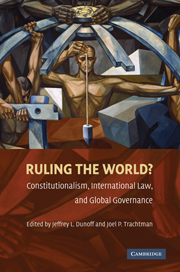Book contents
- Frontmatter
- Contents
- Contributors
- Preface: International Institutions: Why Constitutionalize?
- Acknowledgments
- PART I WHAT IS CONSTITUTIONALIZATION BEYOND THE STATE?
- PART II THE CONSTITUTIONAL DIMENSIONS OF SPECIFIC INTERNATIONAL REGIMES
- 4 The UN Charter – A Global Constitution?
- 5 Rediscovering a Forgotten Constitution: Notes on the Place of the UN Charter in the International Legal Order
- 6 Reframing EU Constitutionalism
- 7 The Politics of International Constitutions: The Curious Case of the World Trade Organization
- 8 Constitutional Economics of the World Trade Organization
- PART III CROSSCUTTING ISSUES
- Index
- References
5 - Rediscovering a Forgotten Constitution: Notes on the Place of the UN Charter in the International Legal Order
Published online by Cambridge University Press: 05 June 2012
- Frontmatter
- Contents
- Contributors
- Preface: International Institutions: Why Constitutionalize?
- Acknowledgments
- PART I WHAT IS CONSTITUTIONALIZATION BEYOND THE STATE?
- PART II THE CONSTITUTIONAL DIMENSIONS OF SPECIFIC INTERNATIONAL REGIMES
- 4 The UN Charter – A Global Constitution?
- 5 Rediscovering a Forgotten Constitution: Notes on the Place of the UN Charter in the International Legal Order
- 6 Reframing EU Constitutionalism
- 7 The Politics of International Constitutions: The Curious Case of the World Trade Organization
- 8 Constitutional Economics of the World Trade Organization
- PART III CROSSCUTTING ISSUES
- Index
- References
Summary
“[I]t would be surprising,” David Kennedy said in his very perceptive contribution to this volume, “if the new [constitutional] order were waiting to be found rather than made.…If there is to be a new order, legal or otherwise, it will be created as much as discovered.” I felt caught in flagrante delicto because that was exactly what I had tried to show some ten years ago in an article titled “The UN Charter as Constitution of the International Community” – that we can rediscover a constitutional quality of the Charter that had been there right from the start but that had fallen into oblivion in the meantime. In the words of my article:
Good arguments support the view that the Charter has had a constitutional quality ab initio. In the course of the last fifty years the “constitutional predisposition” of the Charter has been confirmed and strengthened in such a way that today the instrument must be referred to as the constitution of the international community.
If the failed European Constitution of 2004 was a “treaty which masqueraded as a constitution,” the UN Charter is a constitution in the clothes of a treaty, because no other garment was available in 1945.
However, David Kennedy's skepticism is understandable. Whenever a rather small group of people claims to see something invisible to all the others, suspicion is well founded.
- Type
- Chapter
- Information
- Ruling the World?Constitutionalism, International Law, and Global Governance, pp. 133 - 148Publisher: Cambridge University PressPrint publication year: 2009
References
- 16
- Cited by

